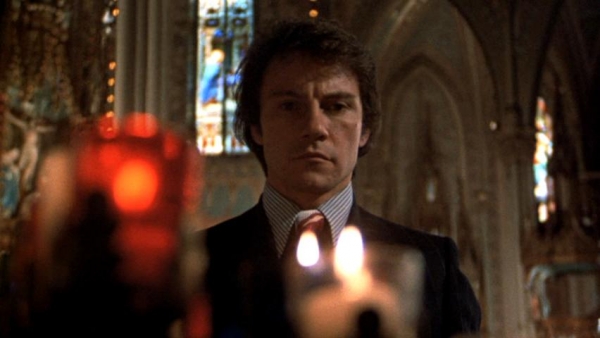Mean Streets
The utter electricity of 1973's MEAN STREETS is impossible to deny, a real announcement to the world that a master director has arrived. Martin Scorsese had already helmed two low budget features, but here is a tale of Little Italy would be wise guys that, in all its disorganization and fury, comes across as a sober, coherent, and strikingly confident narrative. This is Scorsese unbound, seemingly untamed, but that's a genius for ya.
We meet a group of young NYC youths, friends since grade school, scraping an existence. Charlie (Harvey Keitel) works for a loan shark named Giovanni (Cesare Danova), who also happens to be his uncle. He constantly tries to keep Johnny Boy (Robert DeNiro) from the business ends of baseball bats and guns as the latter gambles recklessly and owes everybody money. There's also Tony (David Proval), and Michael (Richard Romanus), one of Johnny Boy's creditors who is losing his patience. For awhile, the guys good naturedly hang out and drink. And drink some more. Maybe that's why meetings that should be friendly often turn into violent fisticuffs (and that wild, brilliantly choreographed pool hall scuffle). The threat of violence seems to always be hanging over their lives.
A bar is a central location in MEAN STREETS, and is almost always bathed in red light. You get thoughts of blood. Some of it is spilled right there, as when another young guy performs a hit in the john. Reactions aren't as concerned as you would expect, but maybe you've never been around guys like these.
Johnny Boy has a cousin named Teresa (Amy Robinson), who is dating a somewhat reluctant Charlie, who has to keep it secret from his uncle. "She's sick in the head," he tells him. He's referring to her seizures. Giovanni also feels that association with her is unwise because of her loose cannon cousin, far from an "honorable man." Teresa is also losing her patience. Charlie is an up and comer looking to be made, but well aware of what may keep him in the sewer. He's a dedicated Catholic who repeatedly holds his hands just over flames to remind him of the wages of sin. Penance? But he wonders where God is more than once. Wondering if redemption comes from within.
Scorsese vividly evokes the neighborhood, even if only some of it was filmed on the mean streets of New York (most interiors and even some exteriors were shot in Los Angeles). The urgency of everyone's plight becomes ours, and this film pulses and breathes like few others. It's not that we don't get a break during quieter moments, but the restlessness is always there. His camera is always in motion: tracking shots, zooms, and even gets strapped to Keitel as he stumbles in a drunk dance. Shots we would see in many later Scorsese pictures. The deft use of music, likewise. I read that many of the tunes came out of Marty's record collection.
The characters are misogynistic and racist, at times real meatheads, but we're always fascinated by them. Keitel is the heart of the movie and is terrific. DeNiro makes a huge impression as a devil may care punk, an atypical role. Some have charged the screenplay, co-written by Scorsese and Mardik Martin, with the same character traits but I always felt it was more anthropological than anything else. Whatever your verdict, these feel like real people. Not condoning, not celebrating their behavior, just observing. In a stunningly assured fashion by a director who finally made his mark, the first of many.

Comments